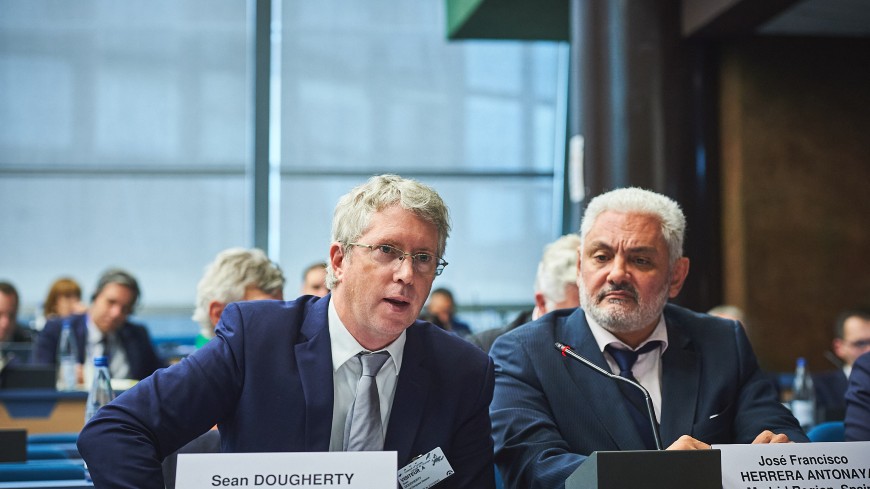Having been hard-hit by the Covid 19 crisis and then by the economic consequences of the war in Ukraine, do European regions have the financial capacity to prepare to take off again once the situation improves, when other threats, foreseeable or otherwise, are looming ahead? If they have the powers to carry out policies best suited to their needs, the answer is yes, according to the participants in a debate on “Regional finances in response to crises” held by the Congress Chamber of Regions on 26 October 2022, with the participation of the OECD.
Having been asked by its 38 member countries to study the way in which regions coped with the financial consequences of the lockdowns imposed during the Covid‑19 pandemic, the OECD found that the regions best equipped to deal with economic crises were those with their own fiscal capacity and also clearly defined responsibilities. “We recommend that governments increase the financial capacity of regions, in particular so that they can run the services under their authority more effectively,” said Sean M. Dougherty, Senior Adviser and Head of Secretariat at the OECD Network on Fiscal Relations. The apportionment of responsibilities between central governments and regions needed to be better defined, and overly vertical approaches had to be avoided, as local and regional authorities were on the front line when it came to the operation of services, he added. He advocated “flexible” responses to crises, as well as the establishment of stable fiscal policies that were better suited to combating tax avoidance and evasion. Lastly, he highlighted the financial challenges which would stem from increased ageing of the population, which was an issue that should be addressed not only centrally but also at regional level.
From Madrid to Helsinki, regions are reviving their economic growth
On the ground, several large regions with extensive powers have initiated crisis recovery strategies which are now beginning to bear fruit, such as the 30 economic measures introduced by the region of Madrid (Spain) in 2021. “We have taken steps to ensure the funding of healthcare and also placed a moratorium on regional levies and taxes, while encouraging co-operation between the public and private sectors and facilitating business start-ups,” said José Francisco Herrera Antonaya, Director General for Co-operation with the State and the European Union of Madrid Region. Cultural and tourist institutions had received support and had been able to reopen very quickly, while shops had been allowed to open around the clock. At the same time, the region had increased its education budget by 16% and expanded support for the self-employed, as well as for young mothers to boost the birth rate. As a result, Madrid’s GDP was now back to 99% of its pre-Covid level and unemployment had fallen 25% in six months.
Similarly, the region of Uusimaa, Finland’s “economic lung”, had managed to transform the support provided to it by central government during the crisis into investments for the future: “The aid was also used to promote research concerning sustainability, recycling and the reuse of materials, including timber, and to foster immigration, which is vital to our economic activity,” said Atte Kaleva, member of the Helsinki-Uusimaa Regional Assembly.
Environment, education and ageing: regional finances must prepare for the future
Many regions are redirecting their budgets towards activities which they regard as priorities. Günther Bergmann (Germany, EPP/CCE) presented the recent budgetary decisions taken by the regional parliament of North Rhine Westphalia, which had decided to increase teachers’ pay, step up the fight against cybercrime and improve protection against natural disasters and flooding. According to Aida Jalilzade (Azerbaijan, ECR), the difficulties regions faced were not the result of economic or political factors alone but also of institutional factors. “Budgetary decentralisation is essential for regions, and it could be asked whether low levels of decentralisation are not themselves an obstacle to recovery,” she said in conclusion.
The President of the Regional Parliament of Carinthia, Reinhart Rohr (Austria, SOC/G/PD), pointed out that his region had spent an additional amount of over €200 million in fighting Covid and had just released €125 million to help people cope with inflation and the energy crisis: “We are increasing benefits for families with young children and are reducing social security contributions.” Nevertheless, he stressed that taxes in Austria were mainly collected by central government and redistributed through a system of equalisation at national, regional and municipal level: greater fiscal freedom for regions could lead to a risk of competition between them, which he did not believe to be desirable.
Lastly, Kevin Bentley (United Kingdom, ECR) called on local and regional elected representatives to start thinking now about the consequences of ageing for their economies: in 2050, 50% of the British population would be elderly or retired, he said, which would be a major financial challenge.
****
43rd Session
Agenda – Web file – Multimedia (Live webcasts, interviews, videos and photo)




